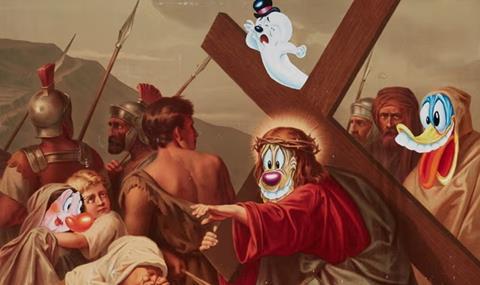Michael Coren is no fan of this “insulting” painting. But the very fact it was allowed to be displayed tells us something important about the influence of Christian beliefs on the West, he says

Art, they say, is in the eye of the beholder.
Depends on the beholder I suppose, but I see nothing of any merit, originality, or genuine provocation in a painting called Jesus Speaks to the Daughters of Jerusalem, that depicts Jesus on the road to Calvary, disfigured with a Looney Tunes cartoon face.
The artist, who goes by the name of ‘philjames’ reckons his work is allegedly about, “reimagining and re-presenting historical painting and sculptural forms” to “generate a sense both of the familiar and the uncomfortable through the displacement of notions of time, place, and history combined with the seemingly seamless interweaving of somewhat obscured pop-cultural references.” Yeah, right!
I’m all for making people think again about long-assumed images, and that certainly includes Christians, but this offering seems more Emperor’s new clothes than cutting-edge and constructive commentary. In other words, totally naked, in all sorts of ways.
The backlash
In Sydney, Australia, where the picture was displayed, there was an organised and active protest, to the point where the picture was eventually removed. A Roman Catholic group named Christian Lives Matter launched the campaign, and called the painting “shocking disrespectful art”. The artist and workers at the gallery claim that they’ve received numerous abusive calls and letters and even threats of physical violence. If so, that’s repugnant.
The founder of Christian Lives Matter, Chris Bakhos, thanked the hundreds of supporters who had “respectfully” called for the work to be removed and said that the picture was, “another cheap and low attempt at mocking Christianity.”
For many years now there has been an open season on Christianity, in art, literature, television, film, and theatre. We are widely mocked and criticised in popular culture. There are many reasons for that, one being that the consequences of having a pop at Christians/Christianity are either positive or harmless. There’s prestige in mocking what is still considered part of the establishment, and in spite of what some may claim, the possibility of physical violence or career damage is minimal.
The obvious contrast here is with Islam. I’ve interviewed Salman Rushdie, author of the Satanic Verses, who was attacked and almost murdered, Kurt Westergaard, the Danish cartoonist who drew the picture of Muhammad wearing a bomb in his turban, and lived the rest of his life under police protection, and others who have felt the sting of religious extremist intolerance. So, there’s clearly inconsistency if not hypocrisy on display, and also a certain smugness.
The obvious contrast here is with Islam
Where does liberty come from?
But all that being said, the Jesus-like response to any controversial issue is based not on the failings of others but on the call of the Gospel. We’re made by God to worship and to love, to celebrate the heart set free, but also to relish all that is given to us, and that certainly includes art and literature. The vocation of the Christian is not to limit but to broaden our vision, not to be reactive but pro-active. The Church has been the hand-maiden of creativity, whether it be the magnificence of the renaissance, the literature of Dostoyevsky and Tolkien, or even Monty Python’s Life of Brian.
If the last seems out of place, let me explain. The very freedoms, the very openness, that allows what seems to be mockery of the faith is a product of the precise Christianity that seems so under siege. Such authentic liberty would never exist in an atheistic society – witness the former Soviet Union, Maoist China, National Socialist Germany – or various Islamic states. The paradox that these ostensible radicals fail to appreciate is that the license they enjoy is a consequence of what they appear to despise.
The paradox that these ostensible radicals fail to appreciate is that the license they enjoy is a consequence of what they appear to despise
As for the works themselves, we have to differentiate. Anything that obliges me to think deeper about my faith is to be welcomed, even if it does sometimes hurt. Nobody welcomes a trip to the doctor but it doesn’t mean we don’t have to go.
Take the above-mentioned Life of Brian for example. There were demonstrations back in 1979 and the film actually banned in certain places. But today when we watch it, we see not Jesus mocked at all, but a biting rejection of collective foolishness, herd mentality, and not listening when truth is spoken. Much of the Christian response at the time was shameful.
Jesus with a fatuous cartoon face isn’t the same thing at all, does nothing to make us think, and is insulting rather than constructive. My response, for what it’s worth, would be to politely ask the artist or the museum director out for lunch or a coffee, to explain what the Christian faith means, to talk about how fellow believers in so much of the world face daily persecution, the horror of blasphemy laws, and how we feel when we see what we hold so dear insulted for no apparent reason. It might work, it might not. But then we have to have faith, don’t we?




































